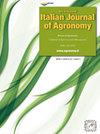Endogenous Calcium Mediated The Seedling Growth And Fluoride Stress Tolerance In Four Bean Genotypes
IF 2.1
3区 农林科学
Q1 AGRONOMY
引用次数: 0
Abstract
Fluoride (F) pollution is a global environmental problem representing a severe risk for food and vegetables grown in contaminated soils. Phaseolus vulgaris L. is widely cultivated in arid and semi-arid regions and in F contaminated areas of the world. F tolerance during germination and seedling growth was evaluated for four bean ecotypes: Borlotto nano and three African genotypes (Lyamungu 85, Lyamungu 90 and Jesca).Seeds were grown in sand enriched with NaF or KF at three different levels (0, 80 and 200 mg kg-1). NaCl was used as a benchmark to determine a potential effect of different Na levels in plant. Total F content and minerals accumulation (Na, K and Ca) in roots and shoots were measured. The translocation factor, growth ratio, F tolerance index were evaluated to estimate plant-salt response. Germination rate decreased with increased F level. Borlotto was more F sensitive (0% germination with 200 mg kg-1of KF and NaF) than African genotypes. Under the highest F concentration (200 mg kg-1), F preferentially accumulated in shoots (Jesca 75.7 mg kg-1, Lyamungu 85 100.1 mg kg-1 and Lyamungu 90 115.4 mg kg-1). Ca content in roots was negatively correlated to F absorption, suggesting its antagonistic role to F mobility.Based on these parameters, Jesca and Lyamungu 85 were the most tolerant species recording a low F uptake and a high Ca content in the root. This study highlighted the central role of Ca, as a key secondary messenger in regulating the plant growth and development under F stress.内源钙对四种大豆基因型幼苗生长和耐氟性的影响
氟污染是一个全球性的环境问题,对在受污染土壤中种植的食品和蔬菜来说是一个严重的风险。菜豆在世界干旱半干旱地区和F污染地区广泛种植。对四种豆生态型:Borlotto nano和三种非洲基因型(Lyammungu 85、LyammunGU 90和Jesca)的发芽和幼苗生长过程中的耐氟性进行了评估。种子在富含NaF或KF的沙子中生长,浓度分别为0、80和200mg kg-1。使用NaCl作为基准来确定植物中不同Na水平的潜在影响。测定了根和地上部总F含量和矿物质(Na、K和Ca)的积累。通过对易位因子、生长率、耐氟指数的评价来评价植物对盐的反应。发芽率随F水平的升高而降低。Borlotto比非洲基因型对F更敏感(用200mg kg-1的KF和NaF发芽率为0%)。在最高F浓度(200 mg kg-1)下,F优先在芽中积累(Jesca 75.7 mg kg-1、Lyammungu 85 100.1 mg kg-1和Lyammung 90 115.4 mg kg-1。根中Ca含量与F吸收呈负相关,表明其对F迁移具有拮抗作用。根据这些参数,Jesca和Lyamungu 85是最具耐受性的物种,记录了根系中低F吸收和高Ca含量。这项研究强调了钙作为一种关键的次级信使在F胁迫下调节植物生长发育的核心作用。
本文章由计算机程序翻译,如有差异,请以英文原文为准。
求助全文
约1分钟内获得全文
求助全文
来源期刊

Italian Journal of Agronomy
AGRONOMY-
CiteScore
4.20
自引率
4.50%
发文量
25
审稿时长
10 weeks
期刊介绍:
The Italian Journal of Agronomy (IJA) is the official journal of the Italian Society for Agronomy. It publishes quarterly original articles and reviews reporting experimental and theoretical contributions to agronomy and crop science, with main emphasis on original articles from Italy and countries having similar agricultural conditions. The journal deals with all aspects of Agricultural and Environmental Sciences, the interactions between cropping systems and sustainable development. Multidisciplinary articles that bridge agronomy with ecology, environmental and social sciences are also welcome.
 求助内容:
求助内容: 应助结果提醒方式:
应助结果提醒方式:


